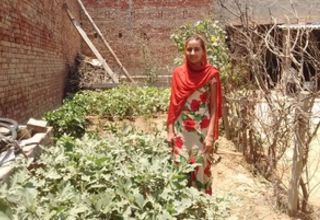Jaspreet Kaur, Chungha, Barnala

Jaspreet Kaur, is 20 years old and is in the final year of her graduation from Barnala District. She is actively involved in cultivating the vegetable kitchen garden in her house and feels passionately about the need for promoting organic cultivating. It has been three years since she along with her mother started cultivating vegetables organically, and her father and brother also occasionally help them out. She says, “earlier all of our family’s land was given out on rent since my father had a job, and before that my grandfather was also employed in the army. Women in cur households cannot go to the farms even if they want to. So we would sometimes grow flowers at home, but that’s about it. In the summer every year, all of us were afflicted with all kinds of diseases – particularly stomach infections. So after attending KVM meeting in our village , we decided to experiment and grow our own vegetables. When they talked about adverse health effects of vegetables laced with chemicals, it resonated with us”. She adds, “I also enjoy the work and like taking care of the plants. My mother and I cultivate the plot, but everyone else in the family is supportive as well.”
“In the first year itself, we had high yields, so we were inspired to continue with it. The KVM activists gave us seeds that year. Then we bought hybrid seeds from the market, but now we make and store seeds for the next season. We tie fully dried seeds in a cloth and store them in a plastic box. Then before sowing we sort out the good seeds by dipping them in a solution of milk and water, and remove the ones that float up to the surface. The plot was prepared using cow dung manure. And we use a solution made with dried cow dung cakes and sour buttermilk to get rid of pests. The pest attacks happen generally during the summer, but ladybugs eat them, so there is no need to spray anything at all most of the time.”
“The vegetables cook quickly unlike the ones brought from the market and they taste much better. Our health improved visibly since we started eating home grown vegetables. Now we just eat pulses or these vegetables in our meals, and avoid buying anything from outside. About two years ago, my mother bought cauliflower from the market. My brother and I were really upset and asked her not to ever buy any vegetables again. We just want to eat what we can grow in our own plot.”
She believes that organic farming can be carried on a larger scale in the farms, by first encouraging people to carry out experiments on a smaller scale, like the kitchen garden where they can grow food for their own families. “Yields are less but the produce can be sold at higher prices. We get organic wheat from a farmer in our village.The biggest problem I think is that people do not want to take on hard work that is time-consuming. In the beginning I did not care for it much either. I just wanted to come home and watch television, but then slowly I developed an interest. Now, I constantly think about how I can make improvements. I ask people I meet if they have new seeds or plants, so that I can experiment with them in our plot. This time we even tried growing saffron between November and March”, she says with excitement. “A relative sent us the seeds. They grew three foot tall. We will send it to a vaid, to check whether it is of good quality or not. I am also thinking about growing some plants in plastic bottles.”
“There is demand within the village for practical demonstrations of organic methods that are really helpful. I have started reading a lot about organic cultivation in magazines and whatever other reading material I can find. When I have any problems, I ask my father for help. I went to the fair organized by KVM in Bathinda in 2013 and that was a really useful experience since there were farmers from different parts of the country. I learnt a lot, particularly, the stall from Andhra Pradesh was really interesting.”
“I would love to grow vegetables on our 8-acre farm as well, but as you know women do not work in Punjab in the fields. It is also difficult to go to the farm everyday to bring vegetables home for cooking. Only wheat and paddy is sown on our farm. Not many girls of my age in the village grow vegetables or take an interest in farming. They are too busy studying and many do not have the kucca yard space in their houses. People prefer to have concrete floors these days because they are cleaner. Most women do not want to take on the burden and say it’s a lot of work. When they spray chemicals they get three pumpkins at one time. What they do not realize is that without chemicals, the plant bears fruit gradually but for a long time. People are greedy and care about short-term gains. In our organic plot, plants like chilli and eggplant do not even have to be sown in the next season. They just bear fruit next year when the time comes. In the summer we grow chillies, pumpkins, different varieties of gourds, mint, beans, okra, capsicum, cucumber, eggplant and petha. In the winter, there is cauliflower, cabbage, carrot, radish, greens, coriander, eggplant, potatoes, onions, garlic, tomatoes and peas. There are about 275 houses in this village, and the ones that do have some kucca space inside the house grow something or the other. When we meet each other, our conversation often revolves around the vegetables – how much has grown and if someone is having a problem they will ask for solutions.”